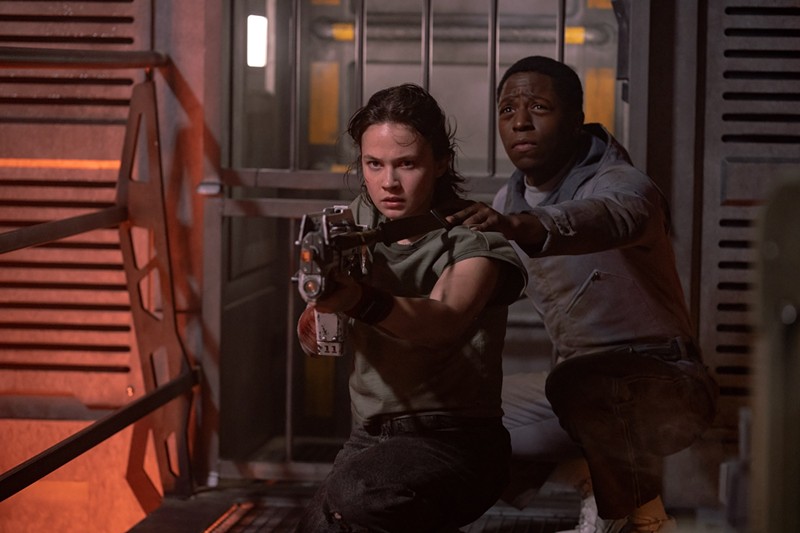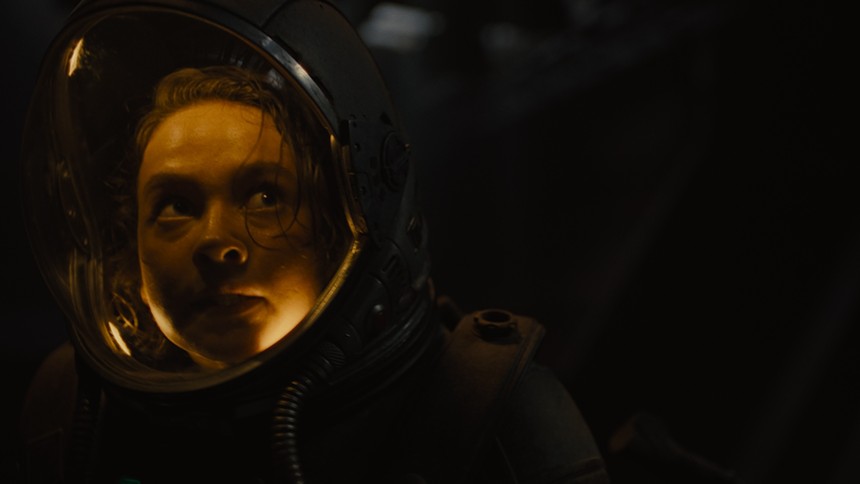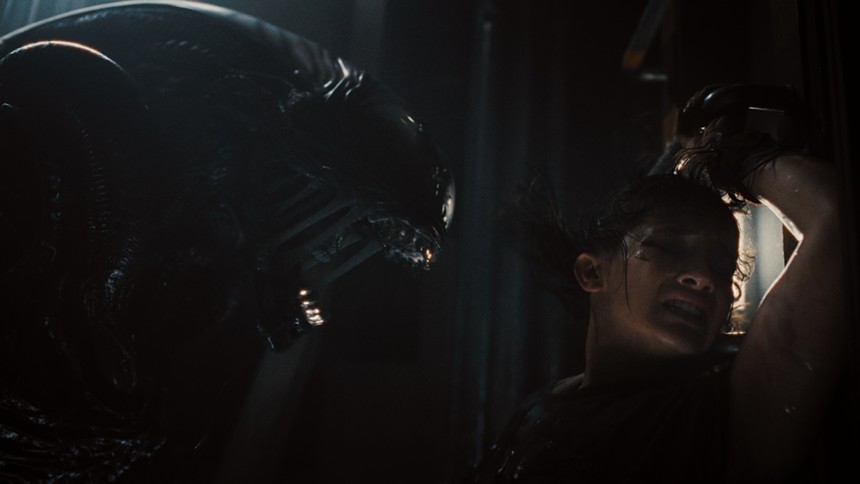Forty-five years exactly have passed since the first Alien movie. What began as a ruthlessly original sci-fi monster movie by a rookie director is now a massive franchise of seven movies — and dozens of comic books, novels, video games, and other media. The H.R. Giger-designed Xenomorph, one of the most viscerally fearsome movie creatures of all time, is now a pop-culture icon. It is very hard to make a new and interesting, let alone scary, installment in a movie series where the audience knows the monster's every move.
Yet somehow, Uruguayan director Federico "Fede" Álvarez has found a way.
Alien: Romulus, the seventh film in the series, takes all the best parts of the first two films — the unbearable suspense of Ridley Scott's Alien, the action and brawn of James Cameron's Aliens — and stitches them together like a skilled surgeon and shoves what doesn't work out of the cargo hold. The result isn't a shuffling Frankenstein's monster of an undead franchise but a ruthless, terrifying, and unbelievably exciting legacy sequel, a proud restatement of cherished themes not unlike the most recent Godzilla movies.
The film wastes little time establishing its premise. Indentured on a bleak, sunless colony by the brutal Weyland-Yutani corporation, Rain (Cailee Spaeny) and her glitchy synthetic human "brother" Andy (David Jonsson) join a crew of young laborers with a plan to infiltrate a derelict space station, access crucial cryo-sleep travel equipment, and escape to a paradise planet known as Yvalga. In a retrospective review of the 1979 film, Roger Ebert noted that the cast was relatively old, effectively transmitting them as grizzled, working-class space truckers; Sigourney Weaver, at 30, was the second-youngest. Here, Álvarez pulls the opposite trick: Nearly the entire principal cast is visibly young, and only one of the actors is over 30. (Jonsson is, just by a hair.) Their youth has been stolen from them by the corporation. In one early scene, Rain, whose parents died in a mining accident, pleads with a heartless company agent to get out of her nearly complete contract. Instead, they double it — "new quotas."
Corporate villainy is at the heart of Romulus, and it manifests in unexpected ways after the crew flies up to the titular station, a former Weyland-Yutani research base. Here, unbeknownst to the protagonists, is where the company had been experimenting on a vicious "perfect organism" — the Xenomorph, the very creature that chased Ripley around the Nostromo in Alien. You can probably figure out what happens next: they get loose, hapless humans get shredded, dissolved, and devoured alive. Human life is cheap in Alien's unhappy future, especially next to the androids.
A certain plot development gives Andy a change of programming — and personality — that turns him into Weyland-Yutani's servant. Corporations are evil; don't trust technology. The messages ring a bit hollow, considering the studio, 20th Century, is now a subsidiary of Disney, the second-largest entertainment conglomerate in the world. And they start to seem hypocritical when you realize one of the actors from the first movie has been resurrected as a new character with the same AI-assisted digital necromancy Disney used on Rogue One.
Beyond that, and an obvious reference to the older films here and there, Romulus' flaws are few and far between, and its virtues plentiful. All the tropes are here, and yet it's such a joy to see the new and creative ways Álvarez deploys them in set piece after nerve-wracking set piece. Facehugger hordes fly at the crew like piranhas leaping from the water. The Xenomorphs' acid blood becomes the key to an elaborate sequence involving zero gravity. Spaeny's Rain, of course, transforms into the intrepid Ripley analogue we always knew she would become. There's a Chestburster kill. There are many, many jump scares — none feel cheap or misplaced. And it all culminates in a bravura final sequence that includes some of the most nightmarish imagery of any Alien film.
But what may be the film's best achievement is its tactility. The use of practical effects and real sets, along with Álvarez's choice to shoot chronologically, gives the film a sense of reality that few blockbusters nowadays can match. All the retro-futuristic technology on display looks as cool as it did in the older films.
Many complain today that Hollywood, so enamored by existing IP and so cautious of new stories, has become incapable of originality. Mark Fisher famously wrote of the inability to create culture that is truly "new" as a symptom of societal malaise. Yet Alien: Romulus is a film that proudly wears its unoriginality on its sleeve, and it deeply impressed me. Álvarez's enhancement doesn't eclipse the films it pays tribute to — Alien will always be more influential and thus more culturally valuable — but it does prove that good filmmaking is the key to making a 45-year-old franchise feel vital and new.
There is perhaps something reassuring about going back to the same well years in the future and finding the water tastes just as sweet — or rather, that the acid blood burns just as hot.
Alien: Romulus. Starring Cailee Spaeny, David Jonsson, Isabela Merced, Archie Renaux, Spike Fearn, and Alieen Wu. Directed by Fede Álvarez. Written by Fede Álvarez and Rodo Sayagues. 119 minutes. Rated R. Opens Friday, August 16; check for showtimes at miaminewtimes.com/miami/movietimes.

Audio By Carbonatix
[
{
"name": "Air - MediumRectangle - Inline Content - Mobile Display Size",
"component": "19274298",
"insertPoint": "2",
"requiredCountToDisplay": "2",
"watchElement": ".fdn-content-body",
"astAdList": [
{
"adType": "rectangle",
"displayTargets": "mobile"
}
]
},{
"name": "Editor Picks",
"component": "17482312",
"insertPoint": "4",
"requiredCountToDisplay": "1",
"watchElement": ".fdn-content-body",
"astAdList": [
{
"adType": "rectangle",
"displayTargets": "desktop|tablet"
},{
"adType": "rectangle",
"displayTargets": "desktop|tablet|mobile"
}
]
},{
"name": "Inline Links",
"component": "18711090",
"insertPoint": "8th",
"startingPoint": 8,
"requiredCountToDisplay": "7",
"maxInsertions": 25
},{
"name": "Air - MediumRectangle - Combo - Inline Content",
"component": "17482310",
"insertPoint": "8th",
"startingPoint": 8,
"requiredCountToDisplay": "7",
"maxInsertions": 25,
"watchElement": ".fdn-content-body",
"astAdList": [
{
"adType": "rectangle",
"displayTargets": "desktop|tablet"
},{
"adType": "rectangle",
"displayTargets": "desktop|tablet|mobile"
}
]
},{
"name": "Inline Links",
"component": "18711090",
"insertPoint": "8th",
"startingPoint": 12,
"requiredCountToDisplay": "11",
"maxInsertions": 25
},{
"name": "Air - Leaderboard Tower - Combo - Inline Content",
"component": "17482313",
"insertPoint": "8th",
"startingPoint": 12,
"requiredCountToDisplay": "12",
"maxInsertions": 25,
"watchElement": ".fdn-content-body",
"astAdList": [
{
"adType": "leaderboardInlineContent",
"displayTargets": "desktop|tablet"
},{
"adType": "tower",
"displayTargets": "mobile"
}
]
}
]














